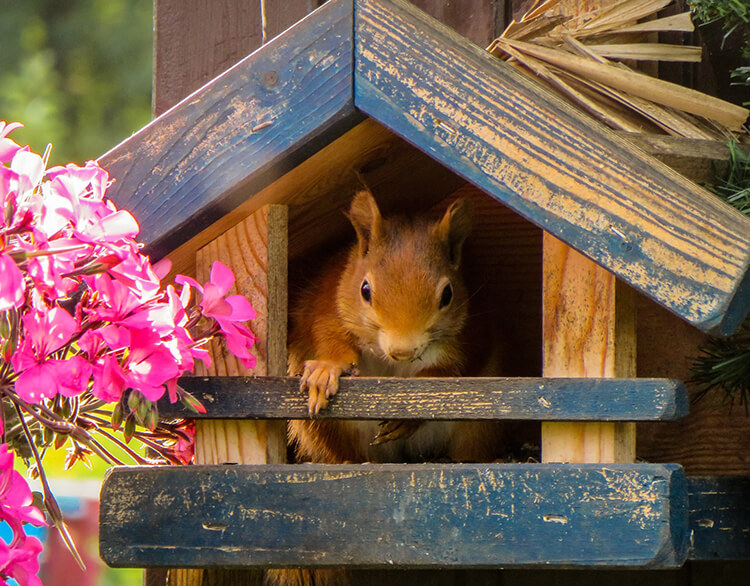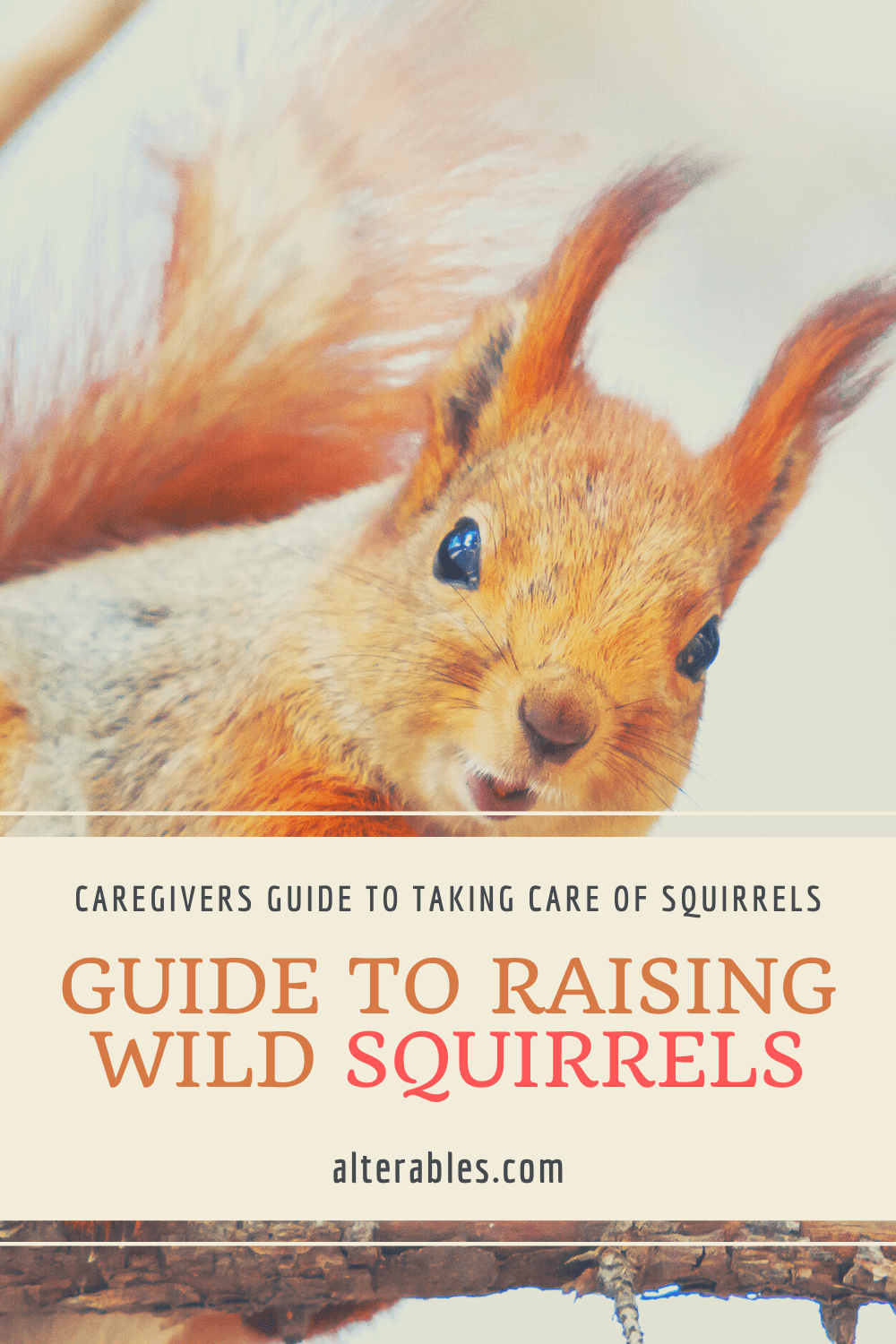
Hence, it is important for us to understand the need for immediate care for the baby to ensure its survival. At first, one should prioritize to get the baby squirrel to a veterinary clinic for assessment. Often, these squirrel babies are discovered injured, dehydrated and hungry; in such cases, they are always in need of immediate care.
The veterinary doctor will also advise you the actual age of the baby squirrel that in turn will help you to dictate the feeding frequency and the type of food that the baby squirrel needs. That’s why it’s vital to get the orphan squirrel assessed at a veterinary clinic to ensure that it gets proper care.
There are certain things that squirrel caretakers should consider when they raise a wild squirrel. While ensuring their good health, the squirrel caretakers should also know the basic necessities required for them to raise the baby squirrel. From the time the caretakers first find one of these orphaned tree-dwellers, they should follow an ideal routine to ensure that the squirrels are properly nourished and grown under natural conditions.
Requirements of raising a squirrel
Feeding
It is the most important step that the caretaker has to follow while raising a baby squirrel. Squirrels usually feed on nuts and legumes. But while offering food to a baby squirrel you should first start with Esbilac milk replacement formula, which is suitable for an orphaned baby squirrel.
Esbilac is similar in nature as that of squirrel’s milk; hence, it’s least likely to cause digestive problem and diarrhea in the baby squirrel. The caretakers should never use any other milk replacement product as it can be deadly for the baby squirrels.
Offering human formula, cow’s milk or cream and goat’s milk can kill your baby squirrel by leading to uncontrollable diarrhea and dehydration. Preferably, caretakers should use a medicine syringe while feeding to minimize the risk of aspiration.
While feeding you should deposit one drop at a time on the baby squirrel’s tongue and continue.
Heating
Usually, the orphan squirrel babies are discovered cold. Hence, warming a baby squirrel should be the first priority as a cold baby might quickly succumb to hypothermia that can lead to death.
While heating the baby, you should use a constant heat source, particularly for younger orphans with insufficient coats around their body. As the babies have a thin coat around their body, they are unable to create their own body heat to keep them warm during the cold.
Using a heating pad is a reliable constant heat source. You must be very careful to ensure that the baby does not chew the cord while the heat pad is used. You can also use the reptile heating pads and fix them to the bottom of a cage or box to provide constant heat while avoiding the baby to get exposed from an electric cord. A microwavable heat pack can also be used as a temporary heat source.
Hydration
Dehydration condition in squirrel babies is commonly found. Caretakers should prioritize in hydrating the orphaned babies as serious dehydration can lead to severe illness and finally death within a few hours.
You can use the Pedialyte or hydration solution for hydrating the babies. The solution should be warmed and given to the babies using a medicine syringe or eye dropper. You should deposit one drop at a time on the baby’s tongue to avoid excess fluid intake. Be careful while offering hydration fluid to the babies and do not deposit the fluids at the back of the mouth while depositing the drops.
Treating Injuries
Usually, the squirrel babies are discovered with injuries. Any type of injury will require immediate veterinary attention without any delay. Hence, it is important to certain measures at home to stabilize the animal before reaching the veterinary clinic. Caretakers should clean up the wounds immediately to minimize the risk of infection.
Using an anti-bacterial soap such as Dial to wash the wounds is one great option; you can use warm water to rinse away the soap and flush the wounds. After cleaning, you should dry the baby and then use Betadine or any similar no-sting disinfectant solution upon the wounds.
If the wound is deep, apply a sterile gauze pad directly to the wound with a generous amount of Betadine.
What Constitutes Good Squirrel Nutrition?
Squirrels also need different varieties of vitamins and minerals in their nutrition. Out of all vitamins and minerals, calcium is the most important one that the squirrels need in their diet. If a squirrel is deficient of calcium in its diet, it might develop diseases like Rickets and metabolic bone disease. Hence, the calcium supplement in the diet is very much vital for the baby squirrels.
Nuts in the shell are the best nutrition for squirrels. It helps them to satisfy their gnawing needs while providing them good chewing exercise and plenty of essential fatty acids and protein to their body. While nuts are an important aspect of squirrel nutrition, they should not be the sole nutrient of a squirrel’s diet. Remember that the squirrels love nuts and they would eat them all the time even when they aren’t hungry. A balanced squirrel diet comprises of vegetables, nuts, cereals, and minerals.
What to Avoid?
- Squirrels shouldn’t eat peanuts as they are not actually nuts but legumes. Again, squirrels develop severe health disorder if they eat such legumes in a higher quantity.
- There is a common misconception that squirrels love to eat dried field corn. But the fact is that squirrels rarely eat the kernels of corn.
Longevity of captive squirrels
A healthy squirrel lives up to 15 years. Generally, the potential lifespan of a squirrel is between 12 to 15 years.
Pitfalls that could arise from raising a wild squirrel
Wild squirrel being the rodents can transmit certain diseases to human. There are instances of transmitting diseases such as rodent plague and West Nile virus infection to humans.
Still, there is no evidence of rabies infection from squirrels. Though squirrels do not usually transmit infections, caretakers should be careful while handling the orphaned babies.



